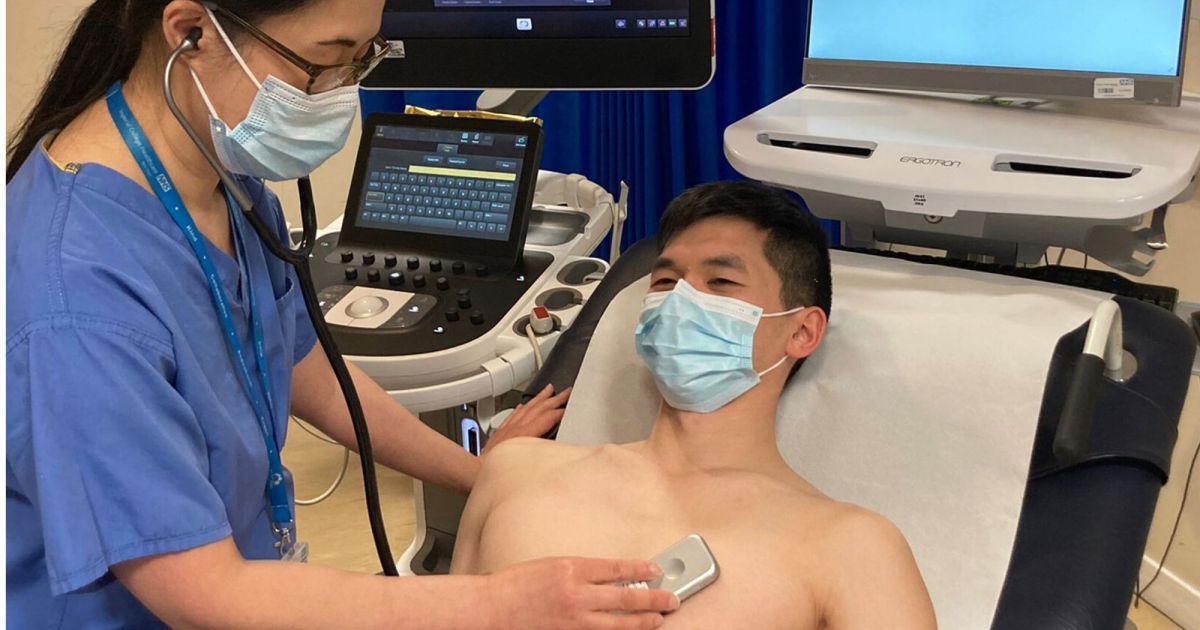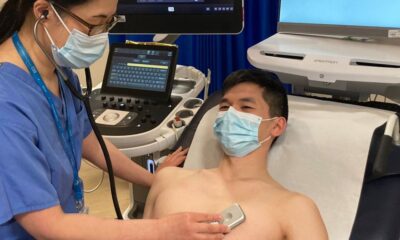Science
AI-Powered Stethoscope Detects Heart Conditions in Seconds

A new AI-powered stethoscope is revolutionizing the way heart diseases are detected, promising results in mere seconds. Developed by Eko Health, this innovative device can identify three serious heart conditions: heart failure (HF), atrial fibrillation (AF), and valvular heart disease (VHD). The stethoscope has been deployed in a nationwide study known as TRICORDER, led by *Imperial College London* and *Imperial College Healthcare NHS Trust*.
The stethoscope, which resembles a compact power bank, utilizes advanced technology to deliver rapid diagnoses. At its core, the device features a single-lead ECG sensor and a microphone array that captures phonocardiogram (PCG) waveforms. This data is processed through algorithms designed to detect abnormalities in heart activity and blood flow. According to the developers, the stethoscope can diagnose the conditions within just 15 seconds after placing it over the upper left sternal border area on a patient’s chest.
Clinical Implementation and Results
As a Class IIa medical device, the AI-driven stethoscope is already authorized for regular use in healthcare settings, allowing doctors and healthcare professionals to integrate it into routine examinations without requiring written consent from patients. The TRICORDER study, which encompasses over 200 general practitioner (GP) surgeries serving more than 1.5 million patients, has yielded promising results.
In their findings, researchers reported that patients examined with the AI stethoscope were approximately 3.5 times more likely to receive a diagnosis of atrial fibrillation. Additionally, these patients were nearly twice as likely to be diagnosed with heart valve disease. The *British Heart Foundation*, which partially funded the study, emphasized the significance of these outcomes in improving early detection rates.
“Statistical performance of these three AI algorithms has been shown to be high and consistent against international external validation studies,” the research team stated in a paper published in *BMJ Open*.
A Focus on Early Detection
The primary aim behind the development of this smart stethoscope is to facilitate early detection of heart problems, enabling patients to receive necessary treatments promptly. Heart failure currently afflicts around one million individuals in the UK, with 70 percent of cases identified only after emergency care is required.
Professor *Nicholas Peters*, a senior investigator at *Imperial College London* and consultant cardiologist at *Imperial College Healthcare NHS Trust*, noted that this device streamlines the detection of serious heart conditions during a single examination. The integration of AI into routine checks could lead to significant healthcare savings. The *National Health Service (NHS)* estimates that implementing this tool in primary care could save approximately £2,400 per patient by reducing the need for unplanned emergency visits.
The TRICORDER trial program has already enrolled over three million patients, indicating a substantial commitment to advancing heart disease detection. As the study progresses, it is expected to yield healthcare savings that could exceed £100 million for the UK government in the long term.
The introduction of this AI-powered stethoscope marks a significant step forward in cardiovascular care, demonstrating the potential of technology to enhance patient outcomes and streamline healthcare processes.
-

 Science1 month ago
Science1 month agoNostradamus’ 2026 Predictions: Star Death and Dark Events Loom
-

 Technology2 months ago
Technology2 months agoOpenAI to Implement Age Verification for ChatGPT by December 2025
-

 Technology7 months ago
Technology7 months agoDiscover the Top 10 Calorie Counting Apps of 2025
-

 Health5 months ago
Health5 months agoBella Hadid Shares Health Update After Treatment for Lyme Disease
-

 Health5 months ago
Health5 months agoAnalysts Project Stronger Growth for Apple’s iPhone 17 Lineup
-

 Technology5 months ago
Technology5 months agoElectric Moto Influencer Surronster Arrested in Tijuana
-

 Education5 months ago
Education5 months agoHarvard Secures Court Victory Over Federal Funding Cuts
-

 Science2 months ago
Science2 months agoBreakthroughs and Challenges Await Science in 2026
-

 Health5 months ago
Health5 months agoErin Bates Shares Recovery Update Following Sepsis Complications
-

 Technology7 months ago
Technology7 months agoMeta Initiates $60B AI Data Center Expansion, Starting in Ohio
-

 Technology6 months ago
Technology6 months agoDiscover How to Reverse Image Search Using ChatGPT Effortlessly
-

 Science4 months ago
Science4 months agoStarship V3 Set for 2026 Launch After Successful Final Test of Version 2














